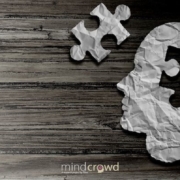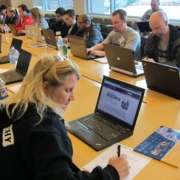Join the Crowd: TGen scientist launches innovative online research test to improve understanding of memory
MindCrowd study drives search for clues to Alzheimer’s disease and other cognitive disorders
PHOENIX – A scientific researcher at Phoenix-based Translational Genomics Research Institute (TGen) has launched a first-of-its-kind online memory test to help better understand human cognition and how it might relate to Alzheimer’s disease and other brain disorders.
Dubbed “MindCrowd”, the study seeks to attract 1 million individuals, aged 18 to 80, willing to complete the 10-minute online memory test at mindcrowd.org. Researchers will use the test results to build a base of data for further study on how cognition and memory changes as people age.
Eventually, the researchers want to leverage this newly-gained biological insight into therapeutic application – treatment. The hope is for the online test to go viral with friends, families and colleagues challenging one another to take the test and compare the results.
MindCrowd is the brainchild of TGen Associate Professor Dr. Matt Huentelman who believes understanding how the brain works in healthy individuals will foster the development of new medicines and therapies for those with brain disorders. Dr. Huentelman’s TGen lab studies the genomics of human neurological traits and diseases with a specific focus on learning, memory and Alzheimer’s.
“MindCrowd is the first research project of its kind,” said Huentelman, an expert in genomics as it relates to memory. “By harnessing the power of the Internet, we can study a million – or more – individuals to help bring us closer to a cure for Alzheimer’s disease and other brain disorders. Combining our knowledge of human genetics and neuroscience with an online research study like MindCrowd is a revolutionary approach to understanding our differences in brain performance and how it may influence risk for disease. We expect to add significantly to our understanding of cognition and how genetic factors impact our memory as we age.”

MindCrowd Project Phases
The MindCrowd project has two phases: Phase I involves memory testing of 1 million or more study participants. Following an in-depth analysis of Phase I test results, researchers will then solicit a subset of Phase I participants willing to donate a DNA saliva sample and undergo an additional round of online testing.
Participation is encouraged from a broad range of ages, backgrounds and cognitive abilities. Those taking the test are free to remain anonymous, although it is encouraged that people share basic data to help the project succeed. The test does not predict or diagnose any condition, rather it provides data on one type of memory and how these processes change as people age and have varied life experiences.
MindCrowd is a collaborative effort among leading scientific research institutions and organizations including TGen, the University of Arizona, Banner Alzheimer’s Prevention Initiative and others.
Please visit www.mindcrowd.org to take the test.
FIND OUT MORE ABOUT YOUR BRAIN.
Discover how it compares with others like you in 10 short minutes by playing the free online MindCrowd memory game.
And help scientists find new ways to protect our brains from memory loss as we age.
Stay Tuned for News about Brain Aging and How to Avoid Cognitive Decline.
# # #
About TGen
The Translational Genomics Research Institute (TGen) is a Phoenix, Arizona-based non-profit organization dedicated to conducting groundbreaking research with life changing results. Research at TGen is focused on helping patients with diseases such as cancer, neurological disorders and diabetes. TGen is on the cutting edge of translational research where investigators are able to unravel the genetic components of common and complex diseases. Working with collaborators in the scientific and medical communities, TGen believes it can make a substantial contribution to the efficiency and effectiveness of the translational process. For more information, visit: www.tgen.org.
About MindCrowd
MindCrowd is online research study to understand the genetics of how the human brain remembers. Specifically, MindCrowd researchers want to know how the way people remember things might change as they age. If researchers better understand the way memory changes as people age, they may be able to understand what changes occur in people who have a brain disease that affects their memory (like Alzheimer’s disease). MindCrowd is part of a research study conducted by the Translational Genomics Research Institute (TGen) in Phoenix, Ariz. For more information, visit: www.mindcrowd.org.
CONTACT:
The Lavidge Company
480.998.2600
Greg Sexton x555
gsexton@lavidge.com
Jennifer Whilttle x551
jwhittle@lavidge.coma









Leave a Reply
Want to join the discussion?Feel free to contribute!